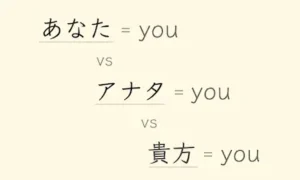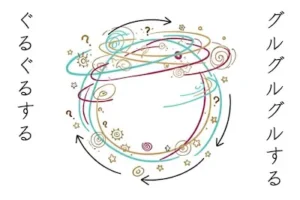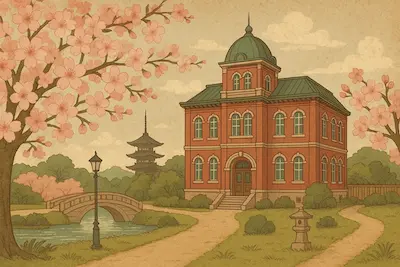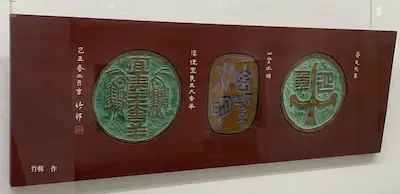
Okagesama (おかげさま): Meaning, Usage, and Japanese Gratitude
What Makes “Okagesama” a Unique Word?
Japanese has many words to express gratitude.
“Okagesama” is one of them.
It is often used in everyday greetings.
But if you think about it, it’s a little unusual.
Why does it include the word “kage” (shadow)?
What feelings are behind this expression?
In this article, we will introduce the meaning and heart of “okagesama.”
When Do People Use “Okagesama”?
For example, here are some common conversations.
A:「おげんきですか?」 Ogenki desu ka?
How are you?
B:「おかげさまで げんきです。」 Okagesama de genki desu.
Thanks to you, I’m well.
A:「ひっこしは おわりましたか?」 Hikkoshi wa owarimashita ka?
Did you finish moving?
B:「おかげさまで、ぶじに おわりました。」 Okagesama de, buji ni owarimashita.
Thanks to you, it went smoothly.
When someone cares about you, the reply often uses “okagesama.”
「うまく いって よかったです」 Umaku itte yokatta desu
I’m glad things went well.
「ありがとうございます」 Arigatou gozaimasu
Thank you.
Such feelings are naturally included.
It is also used even without a clear reason.
For example, when health or work is stable.
A:「さいきん どうですか?」 Saikin dou desu ka?
How have you been lately?
B:「おかげさまで、かわりなく すごしています」 Okagesama de, kawari naku sugoshite imasu
Thanks to you, I’ve been doing fine.
The Origin of the Word and Gratitude for Unseen Forces
“Okagesama” comes from the word kage (影), which means “shadow” or “presence.”
The word is formed by adding respectful prefixes “o” and “sama.”
In old Japan, kage referred to unseen powers.
This included gods, Buddhas, ancestors, and nature.
People believed these invisible forces gently protected them.
So, “okagesama” expresses thanks to things we cannot see.
It is not only for someone who directly helped you.
It also shows gratitude for everyone and everything around you—
people, nature, and the environment.
It’s a way to say “thank you” to the whole world that supports you.
How Is It Different from “Arigatou”?
“Arigatou” is used to thank someone for something they did.
It clearly expresses gratitude to the person.
In contrast, “okagesama” has a broader meaning.
It’s used when you feel that your current situation is not just your own doing.
You recognize that others have supported you in some way.
It also carries warmth and care for the other person.
It gently says, “Thank you for asking,” or “Thank you for listening.”
It’s a softer, more humble way to express appreciation.
Living with “Okagesama” in Mind
People who use “okagesama” naturally tend to live with gratitude.
They notice the many things that support them every day.
They don’t say, “I did it all by myself.”
Instead, they say, “I could do it thanks to everyone.”
That kind of attitude creates a gentle, warm atmosphere around them.
Also, when you say this word, your heart feels calm.
It helps build kind and caring relationships with others.
“Okagesama” is a beautiful Japanese word.
It expresses gratitude and the spirit of humility and connection.
Even simple words in daily life can carry deep meaning.
Let’s continue discovering the warmth of the Japanese language—together.
Have you read my past article on “Mottainai”?
It’s another word full of wisdom and cultural depth.
Japanese has many expressions that reflect its culture.→ Visit the Japanese words category to see more.
Japanese of the Day / 今日の日本語
- Word:おかげさま(okagesama) – thanks to someone / gratitude
- Meaning:expressing thanks for someone’s support or care, often in a humble way
- Example:おかげさまで、元気です。
(Thanks to you, I’m well.) - Fun Fact:Some Japanese people say おかげさまで even when things are just “normal.”
It’s a polite way to show gratitude for everyday life itself, like having good health, food, or a peaceful day.
◆ Would you like to practice speaking Japanese? ◆
In my lessons, you can use Japanese a lot and learn to speak naturally with me.
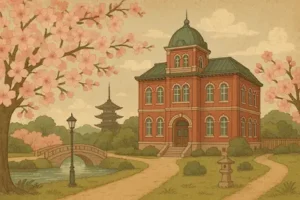
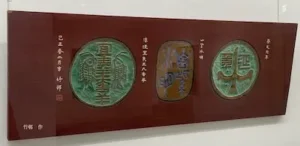
「おかげさま」は不思議な言葉?
日本語には、感謝を表す言葉がたくさんあります。
「おかげさま」もそのひとつです。
あいさつの中で、よく使われます。
でも、よく考えると少し不思議な言葉です。
どうして「影」に「さま」がつくのでしょう?
どんな気持ちが込められているのでしょうか?
今回は、「おかげさま」の意味と心を、ご紹介します。
「おかげさま」はどんなときに使うの?
たとえば、こんな会話があります。
「お元気ですか?」
「おかげさまで元気です。」
「引っ越しは終わりましたか?」
「おかげさまで、無事に終わりました。」
だれかが、自分のことを気にかけてくれたとき。その返事として「おかげさま」はよく使われます。
「うまくいってよかったです」「ありがとうございます」そんな気持ちも、自然にこもっています。
また、はっきりした理由がなくても使えます。体調や仕事が落ち着いているとき。
「最近どうですか?」と聞かれて、
「おかげさまで、変わりなく過ごしています」と答えることもあります。
言葉の由来と、見えない力への感謝
「おかげさま」は、「影(かげ)」に「お」と「さま」をつけた言葉です。
昔の日本では、「影」は見えない力を表していました。
神さまや仏さま、先祖や自然のことです。
そうした存在が、自分をそっと守ってくれている。
人々は、そう信じていたのです。
だから「おかげさま」は、目に見えないものへの感謝の言葉でもあります。
直接助けてくれた人だけではありません。
周りの人や環境など、すべてに対する「ありがとう」とういう気持ちです。
「ありがとう」との違いは?
「ありがとう」は、してもらったことに対して言う言葉です。
相手への感謝を、はっきりと伝えます。
「おかげさま」は、もう少し広い言葉です。
今の自分の状態は、自分ひとりの力ではない。
そう思うときに使います。
また、相手への気づかいやねぎらいの気持ちもこもります。
「聞いてくれてありがとう」という意味も、やさしく伝わります。
「おかげさま」という生き方
「おかげさま」を自然に使う人は、感謝を忘れない人です。
自分を支えてくれているものに、目を向けています。
「ひとりでできた」と言うのではありません。「みんなのおかげでできました」と言える。
そんな人のまわりには、やさしい空気が流れます。
この言葉を使うと、自分の気持ちもやわらぎます。
人との関係も、あたたかくなります。
「おかげさま」は、日本語らしい思いやりを伝える美しい言葉です。
→ 前回の「言葉シリーズ」では、「もったいない」という言葉について書きました。
物を大切にする心を表す、日本ならではの表現です。
日本語には文化をうつす表現が多くあります。→ Japanese words category で、ほかの表現もご覧ください。




